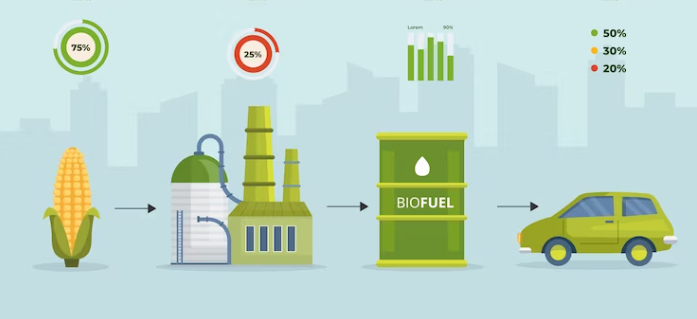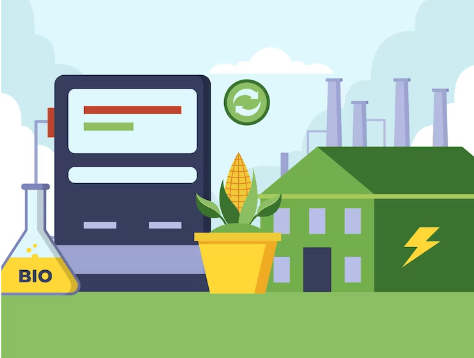Introduction
The importance of embracing cleaner and renewable energy sources becomes increasingly evident as the world faces climate change and energy sustainability challenges. The horizon is bright with hope – World Biofuel Day. This annual observance, celebrated on August 10th, highlights biofuels’ vital role in shaping a greener and more sustainable future. In this blog, we’ll delve into the significance of World Biofuel Day, explore the potential of biofuels, and understand how these remarkable energy sources drive us toward a cleaner and brighter tomorrow.
Understanding Biofuels: Nature’s Green Energy

Biofuels are renewable energy sources from organic materials, such as plants, agricultural waste, and algae. Unlike fossil fuels, which emit harmful greenhouse gases when burned, biofuels offer a cleaner and more sustainable alternative. They contribute significantly to reducing carbon emissions and mitigating the adverse effects of climate change.
The Significance of World Biofuel Day-A Growing Imperative
World Biofuel Day is a timely reminder of the pressing need to transition from traditional fossil fuels to more environmentally friendly and sustainable energy sources. Fossil fuels have powered human progress for centuries and have also been the driving force behind the rise in greenhouse gas emissions, global warming, and air pollution. Since these challenges escalate, exploring and embracing alternative energy sources becomes paramount. It serves as a platform to educate individuals, governments, and industries about the benefits of biofuels, encouraging them to adopt these eco-friendly alternatives.
Promoting Renewable Energy
At the heart of the significance of World Biofuel Day lies the promotion of renewable energy. Biofuels, derived from organic materials such as crops, agricultural residues, and stubble, offer a promising alternative to fossil fuels. Unlike their conventional counterparts, biofuels are carbon-neutral or even carbon-negative, meaning that the carbon dioxide released during their combustion is roughly equivalent to the amount absorbed during their growth. This characteristic makes biofuels a potent tool in the fight against climate change.
Mitigating Climate Change
One of the most significant contributions of biofuels is their potential to mitigate climate change. By reducing carbon emissions, biofuels play a crucial role in slowing down the pace of global warming. The combustion of biofuels releases carbon dioxide, offset by the absorption of carbon dioxide during the growth of the source materials. This closed-loop carbon cycle ensures that the net carbon emissions are substantially lower than fossil fuels.
Enhancing Energy Security
World Biofuel Day underscores the importance of enhancing energy security and reducing dependence on fossil fuel imports. Many countries rely heavily on imported oil and gas, leaving them vulnerable to supply disruptions and price fluctuations. Also by promoting biofuels, nations can diversify their energy sources and reduce their exposure to geopolitical uncertainties.
Boosting Agricultural Sustainability
Another layer of significance lies in the role of biofuels in promoting agricultural sustainability. Culturing crops for biofuel production can create a symbiotic relationship between energy and agriculture. By utilizing crops and agricultural residues for biofuel production, farmers can generate additional income streams while reducing waste and enhancing overall sustainability.
Economic Opportunities and Job Creation
World Biofuel Day celebrates the environmental benefits of biofuels and the economic opportunities they offer. The biofuel industry has the potential to stimulate economic growth, create jobs, and foster technological innovation too. From research and development to production and distribution, the biofuel sector can become a driving force in shaping sustainable economies.
Encouraging Research and Innovation
The observance of World Biofuel Day is a platform to encourage biofuel research and innovation. It highlights the importance of advancing technology, improving production processes, and finding novel ways to maximize the efficiency and effectiveness of biofuel production. By fostering a culture of innovation, World Biofuel Day accelerates the development of sustainable energy solutions.
Spreading Awareness and Education
One of the most crucial aspects of World Biofuel Day is its role in spreading awareness and education. Mainly the observance provides an opportunity to educate the public, policymakers, and industries about the benefits of biofuels and their potential to revolutionize the energy landscape. World Biofuel Day ignites conversations and drives informed decision-making through workshops, seminars, and public outreach.
The Pillars of Biofuel Advancement
- Reducing Carbon Footprint: One of the most compelling benefits of biofuels is their ability to significantly lower carbon emissions. Unlike fossil fuels, biofuels release only the carbon dioxide the plants absorb during their growth, creating a closed-loop carbon cycle that contributes to net-zero emissions.
- Promoting Agricultural Sustainability: Biofuel production often utilises crops and agricultural waste as feedstock. Therefore these approach reduces waste and promotes sustainable land management practices, fostering a harmonious relationship between agriculture and energy production.
- Energy Security and Independence: By diversifying the energy mix with biofuels, nations can also reduce their dependence on imported fossil fuels, enhancing energy security and minimising vulnerability to geopolitical disruptions.
- Economic Growth and Rural Development: Biofuel production can stimulate rural economies by creating agriculture, transportation, and manufacturing jobs. Localized production of biofuels empowers communities and contributes to economic growth.
Biofuels in Action: Success Stories

- Biodiesel: Biodiesel, a renewable substitute for diesel fuel, is derived from vegetable oils, animal fats, and used cooking oil. It has gained traction in transportation and is being integrated into conventional diesel engines with minimal modifications.
- Ethanol: Ethanol, produced from crops like corn, sugarcane, and switchgrass, is used as an additive to gasoline. Flex-fuel vehicles can run on high-ethanol blends, reducing greenhouse gas emissions and enhancing fuel efficiency.
- Algal Biofuels: Algae, with its rapid growth and high oil content, holds the promise of being a game-changer in biofuel production. Similarly algal biofuels can be used in transportation and as fuel, offering a greener solution for the aviation industry.
Challenges and Future Outlook
While biofuels offer tremendous potential, they also face challenges that need to be addressed:
- Land Use and Food Security: Balancing biofuel production with food production is crucial. The responsible use of land and resources is essential to avoid negatively impacting global food security.
- Technology and Efficiency: Continuous research and innovation are needed to improve the efficiency of biofuel production processes and make them economically competitive with fossil fuels.
- Policy Support: Governments play a pivotal role in encouraging the adoption of biofuels through policy incentives, subsidies, and regulations that promote sustainable practices.
Celebrating Tomorrow’s Potential Today
As we approach World Biofuel Day, it’s a time for celebration and reflection. The progress made in the field of biofuels is commendable, and the potential they hold is awe-inspiring. Therefore by harnessing the power of nature’s green energy, Khaitan Bio Energy supports reshaping our energy landscape, reducing our carbon footprint, and paving the way for a more sustainable future.
Lighting the Path Ahead
World Biofuel Day holds multifaceted significance, from mitigating climate change and enhancing energy security to promoting agricultural sustainability and economic growth. This observance serves as a reminder that the journey toward a sustainable future is both possible and essential. As we embrace biofuels and renewable energy sources, we can chart a course toward a cleaner, greener, and more responsible energy future. On this World Biofuel Day, let us collectively commit to illuminating the path ahead and creating a brighter, more sustainable future for future generations.

